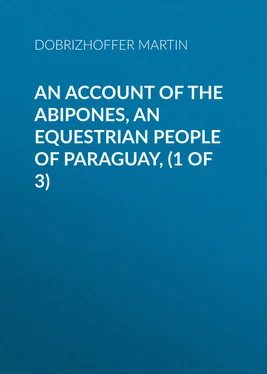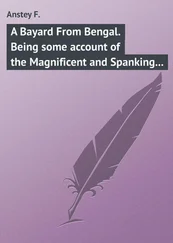Martin Dobrizhoffer - An Account of the Abipones, an Equestrian People of Paraguay, (1 of 3)
Здесь есть возможность читать онлайн «Martin Dobrizhoffer - An Account of the Abipones, an Equestrian People of Paraguay, (1 of 3)» — ознакомительный отрывок электронной книги совершенно бесплатно, а после прочтения отрывка купить полную версию. В некоторых случаях можно слушать аудио, скачать через торрент в формате fb2 и присутствует краткое содержание. Жанр: foreign_antique, foreign_prose, на английском языке. Описание произведения, (предисловие) а так же отзывы посетителей доступны на портале библиотеки ЛибКат.
- Название:An Account of the Abipones, an Equestrian People of Paraguay, (1 of 3)
- Автор:
- Жанр:
- Год:неизвестен
- ISBN:нет данных
- Рейтинг книги:3 / 5. Голосов: 1
-
Избранное:Добавить в избранное
- Отзывы:
-
Ваша оценка:
- 60
- 1
- 2
- 3
- 4
- 5
An Account of the Abipones, an Equestrian People of Paraguay, (1 of 3): краткое содержание, описание и аннотация
Предлагаем к чтению аннотацию, описание, краткое содержание или предисловие (зависит от того, что написал сам автор книги «An Account of the Abipones, an Equestrian People of Paraguay, (1 of 3)»). Если вы не нашли необходимую информацию о книге — напишите в комментариях, мы постараемся отыскать её.
An Account of the Abipones, an Equestrian People of Paraguay, (1 of 3) — читать онлайн ознакомительный отрывок
Ниже представлен текст книги, разбитый по страницам. Система сохранения места последней прочитанной страницы, позволяет с удобством читать онлайн бесплатно книгу «An Account of the Abipones, an Equestrian People of Paraguay, (1 of 3)», без необходимости каждый раз заново искать на чём Вы остановились. Поставьте закладку, и сможете в любой момент перейти на страницу, на которой закончили чтение.
Интервал:
Закладка:
Being informed of this flight of the Indians, I set out thither with forty Christians, among whom was Arapotiyu, who was thoroughly acquainted with the circumjacent ways and woods. But after doing much and suffering more, we effected nothing: and having traversed the banks of the rivers Mondaỹ and Acaraỹ and the interjacent country, without detecting a trace of man, we were forced to remeasure our sorrowful and weary steps: which circumstance filled every honest breast with unspeakable grief. The Spanish and Indian Christians burnt with indignation against that man who had dared to devastate an harvest ripe for the shearers, and ready for the granary of the church.
In endeavouring to make these savages slaves he hindered them from becoming worshippers of the Supreme Being and disciples of Jesus Christ. But divine providence took vengeance on his crimes.
He had a number of hired men employed in the woods of Mbaeverà, upon the preparation of the herb tea, a great quantity of which, already prepared, awaited the mules which were to convey it to the city. Meanwhile it was kept in the hut of the Spanish labourers, an edifice situated on the banks of the river Acaraỹ, which were covered with reeds and tall grass. These were suddenly seized with an immense conflagration, kindled by the savages. The superintendant, fearing for his magazine, in order to extinguish the approaching flame, despatched eighteen of his comrades – to perish in the same conflagration; for a sudden blast of wind inflamed the whole surface so quickly that the Spaniards beheld themselves encircled with fire without an outlet left for their escape. Some leapt into the marshes, but they were almost dry; – some plunged into the mud, but all their endeavours were vain. They were not absolutely burnt, but suffocated, scorched and roasted, their garments, in general, remaining unhurt. The same evening thirteen miserably perished; the next day three more; the other two came to a still more wretched, because a more protracted end. The spies of the savages witnessed this destruction of the Spaniards, but afar off, lest themselves should be hurt; now more daring, from having perceived the fewness of the Spaniards, one, armed with arrows and a club, stole into the Spanish hut where only one man remained. "So," said the savage with a stern aspect, "you have dared to enter these woods, which were never yours! Know ye not that this is our hereditary soil? Are ye not content with having injuriously usurped immense tracts and innumerable woods, spite of the vain opposition of our ancestors? Should any one of us attempt your domains, would he return alive? No: and we will imitate your example. If, therefore, you are wise, if life is dear to you, – haste away, – advise your countrymen cautiously to shun our woods, unless they would be the cause of their own deaths." During this menacing speech the Spaniard remained silent, pale with expectation of the mortal stroke. To save his life, he offered, with a trembling hand, knives, axes, garments and other trifles within his reach; pacified by which the savage returned to his comrades who lurked hard by. The Spaniard, deeming any stay in these quarters extremely perilous, ran off, leaving, to its own fate, many thousand pounds of ready made tea.
I shall here record another excursion to the savages, which, though completed in less time than the former, was productive of more advantage. A company of Spaniards were employed in preparing the herb of Paraguay on the southern banks of the river Empalado. The trees from which these leaves were plucked failing, they commissioned three men to seek for the tree in request beyond the river. By accident they lit upon a hovel and a field of maize, from which they falsely conjectured that the wood was full of savage hordes. This occurrence affected them all with such fear, that, suspending the business upon which they were engaged, they kept within their huts, like snails in their shells, and spent day and night in dread of hostile aggression. To deliver them from this state of fear, a messenger was sent to St. Joachim, requiring us to search for the savages abiding there, and to remove them, when found, to our colony. I applied myself to the task without shrinking, and on the day of St. John the Evangelist commenced my travels, accompanied by forty Indians. Having taken a guide from the Spanish hut, and crossed the river Empalado, we carefully explored all the woods and the banks of the river Mondaỹ-mir̂i, and discovering at length, on the third day, a human footstep, we traced it to a little dwelling, where an old woman with her son and daughter, a youth and maiden of twenty and fifteen years of age, had lived many years. Being asked where the other Indians were to be found, the mother replied that no mortal besides herself and her two children survived in these woods; that all the rest, who had occupied this neighbourhood, had died long ago of the small-pox. Perceiving me doubtful as to the correctness of her statement, the son observed, "You may credit my mother in her assertion without scruple; for I myself have traversed these woods far and near in search of a wife, but could never meet with a single human being." Nature had taught the young savage that it was not lawful to marry his sister. I exhorted the old mother to migrate as fast as possible to my town, promising that both she and her children should be more comfortably situated. She declared herself willing to accept my invitation, to which there was only one objection. "I have," says she, "three boars which have been tamed from their earliest age. They follow us wherever we go, and I am afraid, if they are exposed to the sun in a dry plain, unshaded by trees, they will immediately perish." "Pray be no longer anxious on this account," replied I; "depend upon it I shall treat these dear little animals with due kindness. When the sun is hot, we will find shade wherever we are. Lakes, rivers, or marshes will be always at hand to cool your favourites." Induced by these promises, she agreed to go with us. And setting out the next day we reached the town in safety on the first of January. And now it will be proper to give a cursory account of the mother and her offspring. Their hut consisted of the branches of the palm-tree, their drink of muddy water. Fruits, antas, fawns, rabbits, and various birds, maize, and the roots of the mandiò tree afforded them food; a cloth woven of the leaves of the caraquatà , their bed and clothing. They delighted in honey, which abounds in the hollow trees of the forest. The smoke of tobacco the old woman inhaled, night and day, through the reed to which was affixed a little wooden vessel, like a pan. The son constantly chewed tobacco leaves reduced to powder. Shells sharpened at a stone or split reeds served them for knives. The youth, who catered for his mother and sister, carried in his belt two pieces of iron, the fragment of some old broken knife, about as broad and long as a man's thumb, inserted in a wooden handle, and bound round with wax and thread. With this instrument he used to fashion arrows with great elegance, make wooden gins to take antas, perforate trees which seemed likely to contain honey, and perform other things of this kind. There being no clay to make pots of, they had fed, all their lives, on roasted meat instead of boiled. The leaves of the herb of Paraguay they only steeped in cold water, having no vessel to boil it in. To show how scanty their household furniture was, mention must be made of their clothes. The youth wore a cloak of the thread of the caraquatà, reaching from his shoulders to his knees, his middle being girded with little cords, from which hung a gourd full of the tobacco dust which he chewed. A net of coarser thread was the mother's bed by night and her only garment by day. The girl in like manner wore a short net by day in which she slept at night. This appearing to me too transparent, I gave her a cotton towel to cover her more effectually. The girl folding up the linen cloth into many folds, placed it on her head to defend her from the heat of the sun, but at the desire of the Indians wrapped it round her. I made the youth, too, wear some linen wrappers, which in my journey I had worn round my head as a defence against the gnats. Before this, he had climbed the highest trees like a monkey to pluck from thence food for his pigs, but his bandages impeded him like fetters, so that he could scarcely move a step. In such extreme need, in such penury I found them, experiencing the rigours of ancient anchorites, without discontent, vexation, or disease.
Читать дальшеИнтервал:
Закладка:
Похожие книги на «An Account of the Abipones, an Equestrian People of Paraguay, (1 of 3)»
Представляем Вашему вниманию похожие книги на «An Account of the Abipones, an Equestrian People of Paraguay, (1 of 3)» списком для выбора. Мы отобрали схожую по названию и смыслу литературу в надежде предоставить читателям больше вариантов отыскать новые, интересные, ещё непрочитанные произведения.
Обсуждение, отзывы о книге «An Account of the Abipones, an Equestrian People of Paraguay, (1 of 3)» и просто собственные мнения читателей. Оставьте ваши комментарии, напишите, что Вы думаете о произведении, его смысле или главных героях. Укажите что конкретно понравилось, а что нет, и почему Вы так считаете.












